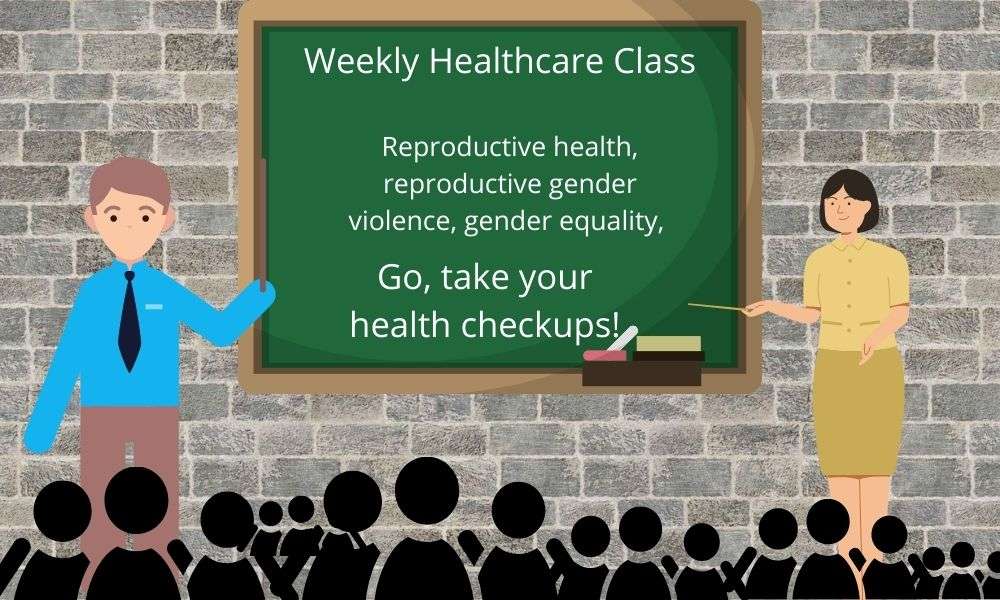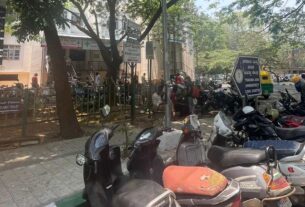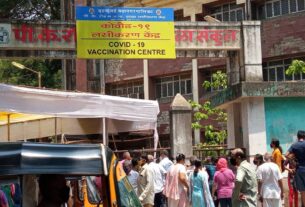There are no healthcare classes and health ambassadors in Bengaluru rural schools.
The Ayushman Bharath guidelines for health education are neglected in Bengaluru rural schools. School authorities have not appointed health ambassadors.
A Government High School in Chikkabidarakallu said, that they do not take separate healthcare classes as it would compromise their regular class. A teacher is supposed to undergo training to provide inclusive health and wellness classes—they would be the health ambassadors—but there is no such teacher in the school. However, medical officials from Primary Health Care Centres come once a month to conduct basic health checkups.
The Operational Guidelines on School Health Programs under Ayushman Bharat recommends health care education in schools. The guidelines are intended for the age group 6–18 years old.
Under Adolescent Health Mission (AHM) and The Rashtriya Kishor Swesthya Kraykram (RKSK), the health ambassadors are expected to teach adolescents about healthy practices, mental health, gender-based violence, sexual health, reproductive rights, and menstrual hygiene.
Deputy Director, School Health, Dr. Veena who is also in charge of RKSK implementation said that the scheme has been implemented in Yadgir and Raichur districts in Karnataka. The implementation process is going on in other districts. Peer educators are being trained in the priority districts. However, she added there is a lack of funds since lockdown so the process is slow.
Moreover, there’s a drop in the distribution of Weekly Iron Folic Acid Tablets (WIFS) to students. The annual report of the Ministry of Health and Family Welfare shows that due to the pandemic, the coverage for the in-school beneficiaries has gone down to 3.6 percent in 2020 from 33 percent in 2019.
Rohith D.N, a student of class two said that he didn’t get any IFA tablets, and there are no health checkups in his school. His mother added that there are no eye checkups in his school—she has never heard of schools providing such a thing.
Dr. Prakash Veghmal, a pediatrician, said, “When the child goes to primary school, they should be able to have social interaction and play with other children Teachers should report any deviation from normal social, linguistic, and intellectual development to the parents who should get their child checked by the pediatrician. But adolescents have different problems, basically, behavioural issues. It requires psychologists and educational psychologists to address the issues of adolescent children.” Doctor Veghmal explained. He added, “As the child is changing to primary and secondary adolescents, hormonal changes happen and that has to be educated by the teachers.”
Some schools are distributing IFA tablets, but the implementation of other health guidelines is still not happening. Rajnikanth, assistant headteacher of G.L.P Lower Primary School in Devagere village, said, “We’re giving IFA tablets weekly. Nurses from nearby public healthcare facilities, come to distribute them among children. We were also distributing ration kits to students during the lockdown.”
Nisarga Public School’s headteacher, T.K Manjula said that her school is distributing IFA tablets weekly and carrying out check-ups as well. “After classes are over, we’re taking healthcare classes, and giving students exercises. We teach them how to follow Covid norms and how to increase immunity,” she added.
The AHM covers the Health and Wellness Program, Peer Educators Program, Iron Folic Acid Supplementation Program, Adolescent Friendly Health Clinics, Scheme for Promotion of Menstrual Hygiene among Adolescent Girls. It was launched in 2014 to promote the holistic development of young people in the country. Currently, India is home to the largest adolescent population, almost 253 million. The teenagers spent most of the time of the day in school and as the schools are opening up, health screening in school is important.




